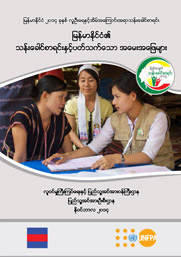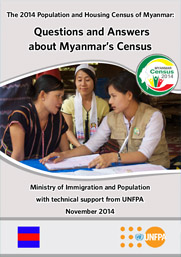A new UNFPA-supported booklet: Questions and Answers about Myanmar’s Census, seeks to address questions that have arisen in the wake of the 2014 Myanmar Population and Housing Census. Through extensive consultation, different communities across Myanmar have shown interest, raised concerns and also become more curious about the census and the "what's next" after the population count. This publication is part of a larger effort to shape a people-centered approach to census data release and dissemination. It aims to help to build public trust, understanding, acceptance and use of census data at all levels. The questions raised and answered provided all emanate from consultations with diverse and numerous groups in states and regions in Myanmar.


The publication is the result of a series of consultations and interactions that are ongoing and started in May 2014. These have involved meetings on data release and dissemination with representatives of different sectors of society across States and Regions in Myanmar, including women and youth organisations, political and religious leaders, non-state and state leaders, ethnic groups, political parties, civil society and community-based organisations, prominent individuals from the private and business sectors, as well as media and government officials. In addition to the meetings that occurred in Regions and States, visits by mixed groups of stakeholders have taken place to the Census Centre in Nay Pyi Taw to enable groups to see for themselves the various phases of the ongoing census process. Link to the full publication.

